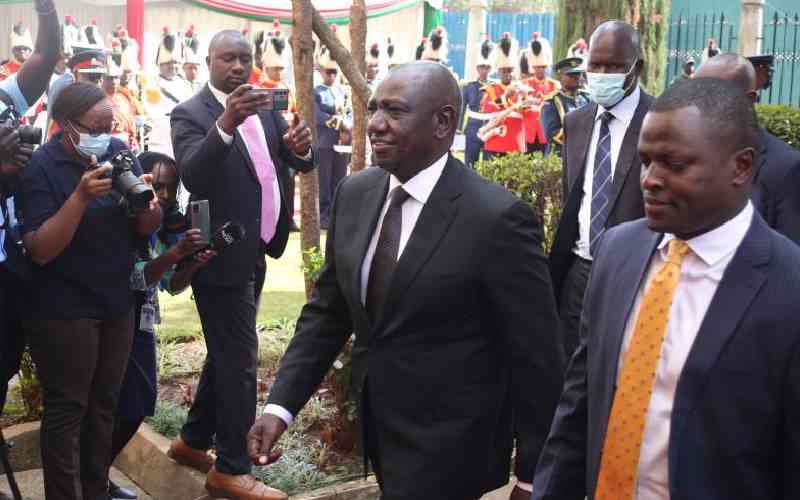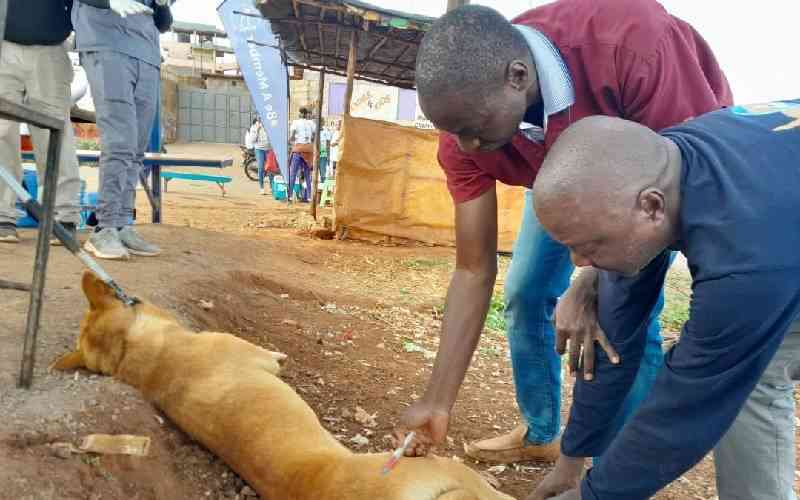Namaita Langoluya, 40, was asleep in her 'manyatta' in Maundu ni Meeri area in Laikipia, when an unusual sound woke her up.
And what Ms Langoluya had at first dismissed as the pet dog turned out to be a hyena that would leave her and the four children under the doctor’s watch for days. Consequently, she has been bedridden for two months now, robbing the family of the little income she earned.
On the fateful night, on July 29, she was alone with the children as her husband Lese who works as a night guard, was away on duty. And the brave woman was not the one to let the intruder have its way. At least not without a fight.
“I fought the animal to protect my six children including the one-year-old. The beast bit and scratched me but I could not relent,” she said.
Her screams woke up their six children who were also injured in the melee. The 3am battle lasted for more than half an hour before neighbours responded to Langoluya’s distress call and killed the hyena, but not without injuries.
Wildlife officers who collected brain samples from the dead hyena to test for rabies confirmed the families fears. The hyena had the killer disease.
And since then, Langoluya and her one-year-old Barichoi, are still admitted to Nyahururu District Hospital. The two, together with the other five children, were given five doses of anti-rabies vaccine with follow-up observation by public health officials.
High cost of treatment
Her husband Lese, abandoned his job to take care of their five children who were discharged from hospital. For the last two months, he has been juggling between casual jobs and visiting his family in hospital.
Langoluya laments: “Sina nguvu yoyote sasa na sijui nitaendelea aje na maisha yangu ya kawaida. (I am no longer strong and I don't know how I will survive).”
Before the attack, Langoluya was a casual labourer in nearby tomato farms, where she used to earn Sh200 every day to cater for family needs. At times, she would be accompanied by her husband, but for the last two months, life has changed after she was bedridden.
Dr Mathew Muturi, an epidemiologist with the recently established, Zoonotic Disease Unit says that the high cost of treatment is a burden to the government and household budgets.
Muturi notes that the average cost for rabies treatment is Sh15,000 and Langoluya’s bill must have risen to more than Sh100,000 since she underwent surgery on her left thigh and has been admitted for more than two months.
He added: “Shortage of post-exposure prophylaxis are also common in many rural remote locations of Africa, further increasing the costs as victims are forced to travel to far flung centres for treatment.”
In addition, victims of rabid dog bites and their families suffer psychological trauma due to uncertainty over the inevitable outcome.
Stay informed. Subscribe to our newsletter
The medic notes that the data on human rabies deaths submitted to the World Health Organisation from Africa are a gross under-estimate of the true burden of the disease.
“The burden associated with rabies remains highest in the developing world, with more than 95 per cent of all human deaths occurring in Africa and Asia, with about 56 per cent of the cases occurring in Asia and 43.6 per cent in Africa, mostly in rural areas,” said Muturi, adding that this translates to one death due to rabies every ten minutes in the two continents.
Rabies victims are often too ill to travel to hospital or die before arrival; families recognise the futility of medical treatment for rabies; misdiagnosis of rabies and laboratory confirmation of clinically suspected cases is difficult.
 The Standard Group Plc is a
multi-media organization with investments in media platforms spanning newspaper
print operations, television, radio broadcasting, digital and online services. The
Standard Group is recognized as a leading multi-media house in Kenya with a key
influence in matters of national and international interest.
The Standard Group Plc is a
multi-media organization with investments in media platforms spanning newspaper
print operations, television, radio broadcasting, digital and online services. The
Standard Group is recognized as a leading multi-media house in Kenya with a key
influence in matters of national and international interest.
 The Standard Group Plc is a
multi-media organization with investments in media platforms spanning newspaper
print operations, television, radio broadcasting, digital and online services. The
Standard Group is recognized as a leading multi-media house in Kenya with a key
influence in matters of national and international interest.
The Standard Group Plc is a
multi-media organization with investments in media platforms spanning newspaper
print operations, television, radio broadcasting, digital and online services. The
Standard Group is recognized as a leading multi-media house in Kenya with a key
influence in matters of national and international interest.





